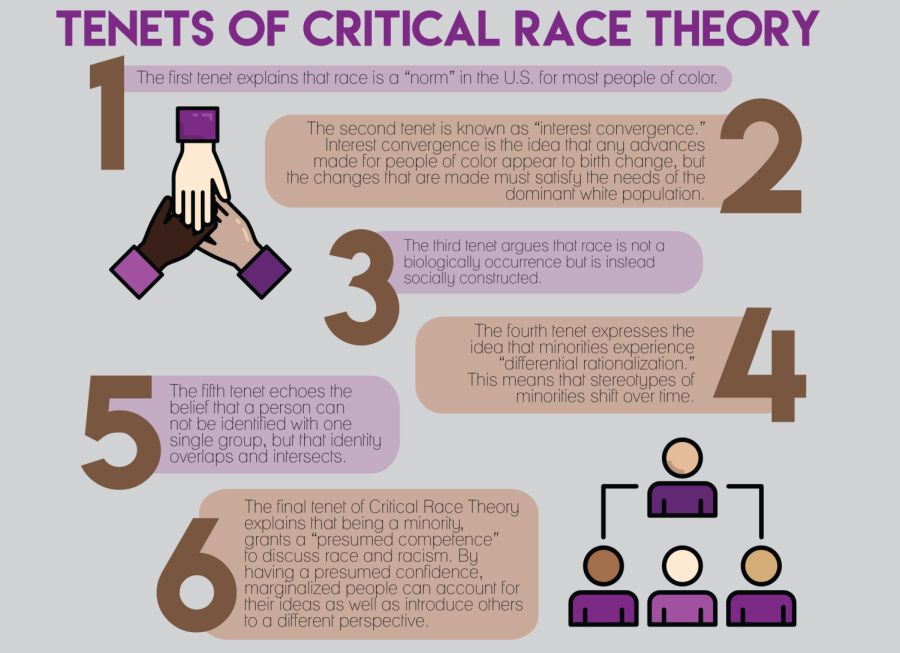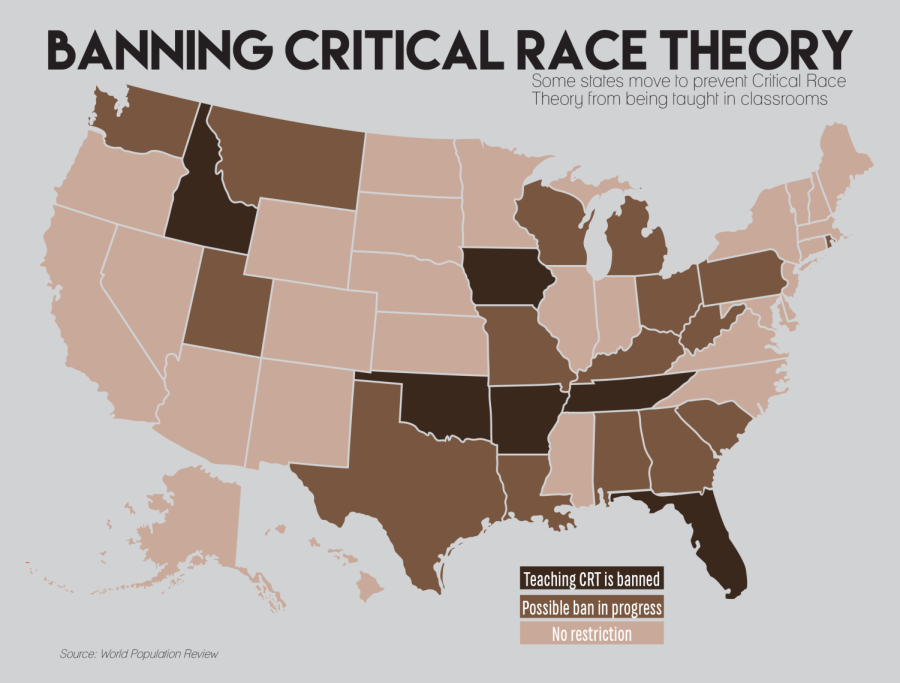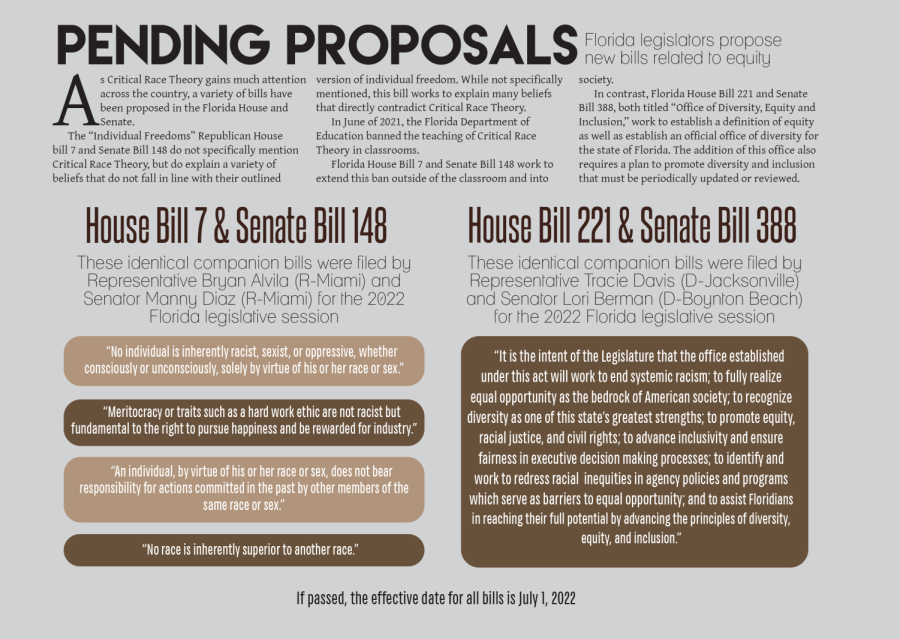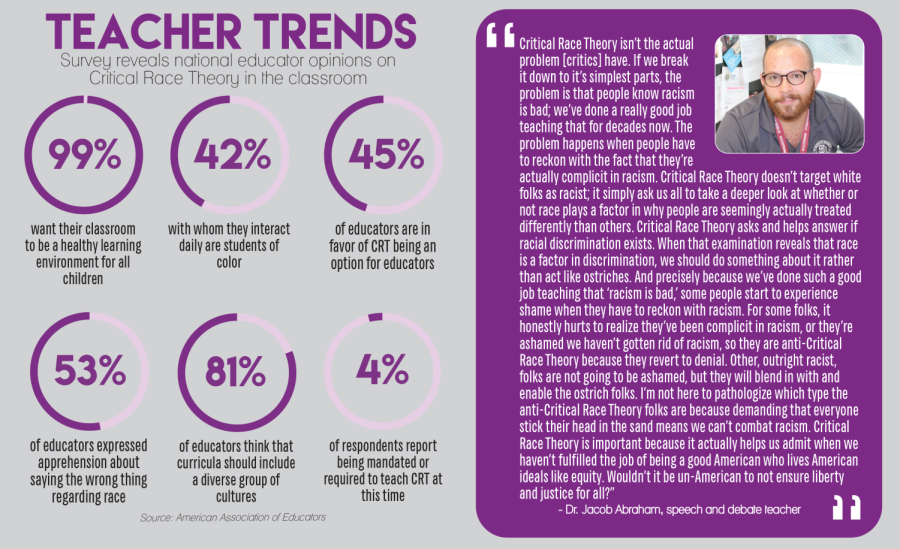Your donation will support the student journalists of Marjory Stoneman Douglas High School. Your contribution will allow us to purchase equipment and cover our annual website hosting costs.
Critical Race Theory is composed of six core pillars, called tenets.
Critical Controversy
Heated political discussions around Critical Race Theory create controversy across US, leading to state bans
February 22, 2022
Serving as one of the most heated topics in school board meetings, Congress and many state legislatures, the controversy surrounding Critical Race Theory currently serves as a major point of contention in the United States. Critical Race Theory pulls many of its foundational beliefs from the 1960s and 70s writings and teachings of Derrick Bell, the intellectual father figure of the theory, who believed that due to its long roots, racism was a permanent and reoccurring issue.
Critical Race Theory holds the position that racism is deeply rooted in American history and reappears in society despite apparent progress made toward achieving racial equality. Critical Race Theory explains that racism is entrenched in U.S. institutions, which is commonly referred to as systemic racism.
Many states are now in the process of banning or have already banned the teaching of Critical Race Theory in schools.
What is Critical Race Theory?
Officially coined and created in 1989 at the first Critical Race Theory Workshop in Madison, Wisconsin, Critical Race Theory was born after a group of more than 20 scholars worked to identify shifting and more subtle enactments of racism in America. Some of the scholars who played a role in the creation of Critical Race Theory include Kimberlé Crenshaw, Angela Harris, Charles Lawrence, Mari Matsuda and Patricia Williams. The theory was then taught in law schools to better explore the idea of intersection between race and law. Law professor Alan Freeman is credited with writing many foundational articles outlining Critical Race Theory.
Critical Race Theory has six foundational beliefs, commonly referred to as tenets. The first tenet explains that race is a “norm” in the U.S. for most people of color. While the U.S. has experienced an evolution in the rights of minorities, Critical Race Theory holds the belief that most people still continue to face racism and discrimination in various areas of their life.
The second tenet is known as “interest convergence.” Interest convergence is the idea that any advances made for people of color appear to birth change, but the changes that are made must satisfy the needs of the dominant white population. In simpler terms, Critical Race Theory argues that minorities gain support from white people only when white people will benefit.
The third tenet argues that race is not a biological occurrence but is instead socially constructed. This position on race has been supported by many scientific scholars since the late 20th century. Some critical race theorists hold the belief that race is a false correlation between physical and behavioral characteristics. The commonly accepted constructs of race have, in turn, led to years and years of generational feelings of superiority and inferiority.
The fourth tenet expresses the idea that minorities experience “differential racialization.” This concept states that stereotypes of minorities shift over time. Different for each minority group, these stereotypes are commonly seen in pop culture and vary based on current events. For example, when U.S. immigration issues experience an increase in attention, the adverse reaction is a rise in anti-Hispanic rhetoric.
The fifth tenet echoes the belief that a person can not be identified with one single group. A person may identify as a female but may also have a sexual, political or religious identity. Put simply, this tenet expresses that minorities have overlapping and intersecting identities.
The final tenet of Critical Race Theory explains that being a minority, grants a “presumed competence” to discuss race and racism. By having a presumed confidence, marginalized people can account for their ideas as well as introduce others to a different perspective.
The relation between Critical Race Theory and systemic racism also breeds a major question: what is systemic racism and how is it present in today’s society?
Systemic racism is a principle arguing that while racism is the outward or obvious oppression of someone because of race, systemic racism is instead described as a pervasive, yet subtle, obstacles at the core of major institutions or systems throughout American society, which disproportionately impacts minority groups, specifically racial minorities.
Rebirth of Critical Race Theory
While grappling with the unknowns of the COVID-19 pandemic, the U.S. also experienced a resurgence of broader social movements for substantial changes throughout society to get closer to a world with less injustices, among the movements is racism. Somewhere in the midst of this ongoing conversation, the discussion over Critical Race Theory was introduced to general society and sparked conversations about what Critical Race Theory is and whether it should be an approved curriculum in the education system.
The controversy surrounding Critical Race Theory began bubbling after Manhattan Institute for Policy Research fellow Christopher Rufo began investigating anti-racism work training. After filing a Freedom of Information Act request, Rufo summarized his perspective in an article published in July 2020 in City Journal. Within the article, he explains he that feels the City of Seattle’s anti-racism curricula “endorses principles of segregation, group-based guilt and race essentialism.” Rufo’s published article in City Journal gained national support from others who felt they also had an issue with the anti-racism training at their own job. Across various anti-racism trainings, many cited the work of authors like Ibram Xolani Kendi and Robin DiAngelo are credited much of their outlooks on race to Derrick Bell and Kimberlé Crenshaw with roots in Critical Race Theory.
Rufo continued to publish a variety of articles in City Journal as he received more and more information on the various approaches taken in anti-racism training across the country. On Sept. 2, 2021, Rufo appeared on Fox’s primetime show “Tucker Carlson Tonight.”
“Conservatives need to wake up. This is an existential threat to the United States. And the bureaucracy, even under Trump, is being weaponized against core American values. And I’d like to make it explicit: The President and the White House—it’s within their authority to immediately issue an executive order to abolish critical-race-theory training from the federal government. And I call on the president to immediately issue this executive order—to stamp out this destructive, divisive, pseudo-scientific ideology,” Rufo said on the show.
While on the show, Rufo gave a three-minute monologue discussing the implications of current racial sensitivity and anti-racism training across the country. After his appearance on Fox, Rufo’s definition of Critical Race Theory continued to gain national attention.
“I believe that, especially as a teacher of social studies, of history and of government, and even with my background as a debate teacher, I believe it’s important to look at multiple perspectives within the issue. So to say that I would teach one perspective at the exclusion of others, I think would be negative no matter what perspectives it is,” American history teacher Ryan Cole said.
Critical Race Theory now serves as a major issue due to varying levels of comprehension, awareness and perspectives across the political spectrum.
In a state news release issued on Dec. 15, 2021, Florida Commissioner of Education Richard Corcoran said, “Our classrooms, students and even teachers are under constant threat by Critical Race Theory advocates who are attempting to manipulate classroom content into a means to impose one’s values on students, when instead schools should be empowering students with great, historically accurate knowledge and giving those students and their families the freedom to draw their own conclusions.”
Many conservative politicians like former President Donald J. Trump have been outwardly against teaching Critical Race Theory in schools. Many dissenters of the theory believe that teaching it in schools creates a more divided society. This belief is fueled by the idea that Critical Race Theory classifies white people as “oppressors” and all Black people as “oppressed.” The theory instead uses history and current day politics, practices and events to explain how minorities are still impacted by racism.
“I teach many things in my class that are directly rooted in the Florida State Standards for American History,” Cole said. “I think that when we look critically at our history in general, that promotes a learning environment where students and adults are taught to question narratives that have been put in front of [them] their entire lives.”
The recent discussions of whether or not there is a place for Critical Race Theory in history curriculum also sheds light on the fact that many Americans are still unclear on the true principles of the theory. According to a Reuters national opinion survey, taken in July 2021, 57% of surveyed adults were unfamiliar with the term, and 22% of those familiar with the term were under the misconception that Critical Race Theory is already being taught in most public high schools across the country. Of those familiar with the theory, 33% thought that Critical Race Theory says that “white people are inherently bad or evil” or that “discriminating against white people is the only way to achieve equality,” both of which are false.
“[Critical Race Theory] has the word critical in the title, which implies that it’s designed to provide a critique of society. So in a society where we can recognize that racism exists, and I think we can recognize that it exists in the United States, then to be critical of the institutions is a system of improving those institutions,” English teacher Holly Van Tassel-Schuster said.
Instructing Critical Race Theory is a divisive subject among teachers.
CRT in the Classroom
The varying reactions to Critical Race Theory has brought about many questions: What states allow Critical Race Theory to be taught? Which states do not? What exactly does the common Critical Race Theory material include?
A notice of change published by the Florida Department of Education on May 5, 2021 defines Critical Race Theory as “the theory that racism is not merely the product of prejudice, but that racism is embedded in American society and its legal systems in order to uphold the supremacy of white persons.” Many scholars have contested the FLDOE’s definition of Critical Race Theory.
The FLDOE also outlines that teachers may not use material from the 1619 Project, an initiative working to “reframe the country’s history by placing the consequences of slavery and the contributions of Black Americans at the very center of our national narrative.” Lastly, the state outlined that American history must be exclusively defined as “of a new nation based largely on universal principles stated in the Declaration of Independence.”
The same notice explains that instruction must feature topics like the Holocaust, slavery, the Civil War and Reconstruction, the Civil Rights movement and the contributions of women, African American and Hispanic people that is supported with facts. In addition, an objective approach must be taken when teaching these topics. After highlighting major topics as part of American history, the official notice also references Critical Race Theory as a theory that is not included in school curriculum as an effort to minimize distortion of history.
In June 2021, Florida Gov. Ron DeSantis directed the Florida Department of Education to ban any teaching of Critical Race Theory in the public school system. After a unanimous vote by Florida’s State Board of Education, it became one of the largest public state education systems to take this position.
On Dec. 15, 2021, DeSantis announced the Stop the Wrongs to Our Kids and Employees Act. Under the proposed act, parents are granted the right to “private right of action” to help enforce the state’s ban in schools. This act would extend itself to companies as well. If employees receive training on Critical Race Theory, they would have the right to sue the company or business. DeSantis’ proposal can not be located within the state House or Senate. As governor, DeSantis does not have the power to file or propose bills in either the state House or Senate. Some feel DeSantis’ proposal of the act serves as the basis to create the idea that this act is in effect while in all actuality, it does not exist.
“I think it’s hypocritical for DeSantis to tell private companies that they can’t train people, however they see fit to run their business, considering he believes in free market principles and private enterprise. What roles he wants to take with regard to public education is part of his purview as the governor of the state,” speech and debate teacher Dr. Jacob Abraham said. “I think that they are not pedagogically sound decisions. He doesn’t have any training in pedagogy, so I can understand why he might propose ideas that do not make sense in a larger educational landscape.”
On Jan. 19, the Florida Senate Education Committee, which has a majority Republican makeup, advanced SB148, also called “Individual Freedom,” which was sponsored by Republican Senator Manny Diaz. The bill would not allow for legal recourse, but instead would allow for restricted conversations based on students or workers feeling “discomfort, guilt, anguish or any other form of psychological distress on account of his or her race, color, sex, or national origin.”
The bill outlines that teachers would be allowed to discuss or address the effects on a person’s freedoms due to sexism, slavery, racial oppression, racial segregation and racial discrimination as well as the enactment of laws. However, teachers can not “indoctrinate or persuade students to a particular view point.”
“I think that Critical Race Theory gives students a chance to really examine history in its raw form, allowing us to see where people went wrong in the past. It creates an environment of accountability and growth,” junior Noldine Belizaire said.
In the Florida House of Representatives, companion bill HB0007 has been filed by Republican Representative Bryan Avila, also named Individual Freedom.
Critical Race Theory is currently banned in six other states: Arkansas, Idaho, Iowa, New Hampshire, Oklahoma and Tennessee. While only a few states have official bans against teaching Critical Race Theory, 16 other states are currently working on bills to pass through the state legislature to ban teaching the theory in classrooms.
As many states continue to work to ban the teaching of Critical Race Theory in classrooms, some question what specifically is banned. For example, some wonder if specifically teaching the theory using the theory, is banned or can teachers teach the aspects of the theory as long as they do not specifically reference the theory? Are some teachers going to stop teaching something that isn’t Critical Race Theory out of fear that it will be mistaken?
Some also ask if the theory can be used to teach other aspects of the curriculum. For example, the Broward County Public Schools High School Debate 3 Honors curriculum standard LAFS.1112.RI.1.1 states “Cite strong and thorough textual evidence to support analysis of what the text says explicitly as well as inferences drawn from the text, including determining where the text leaves matters uncertain.” With many similar standards seen in other subjects, would assignment 30 pages of Critical Race Theory be allowed as reference material for teachers and students to work on other course standards?
“I don’t know of a single educator across the country at a high school or lower level other than myself, that’s actually given actual Critical Race Theory material to their students as an opportunity to learn from the authors of the concept, so it’s a moot point to ban something that no one’s teaching if I’m the only one that’s taught it,” Abraham said.
In a survey of 364 Marjory Stoneman Douglas High School Students, 57% of students say they have no understanding of Critical Race Theory. Of the 57% who say they understand what Critical Race Theory is, 60% think Critical Race Theory should be taught in schools, 25% think Critical Race Theory should maybe be taught in schools and 13% do not think Critical Race Theory should be taught in schools.
“There are people who think they’re teaching it that aren’t and are otherwise teaching history, which is fine, but if the attempt is to ban history is the goal, then we need to reckon with what it means to censor and sanitize or whitewash American history. Let’s have a conversation about that,” Abraham said. “Not whether or not racism exists, because it does, and whether or not we can critique the racism that exists in the system. To argue that those things don’t exist and shouldn’t be critiqued is to dehumanize the people who are the victims of racism.”
With many across the county debating the place for Critical Race Theory in society, this discussion is ever-evolving as new perspectives come about. As time passes by, many people, political parties and elected officials continue to debate whether or not Critical Race Theory has a place in society. Only time will tell the fate of Critical Race Theory in classrooms, business training and other areas of society.
This story was originally published in the February 2022 Eagle Eye print edition.




